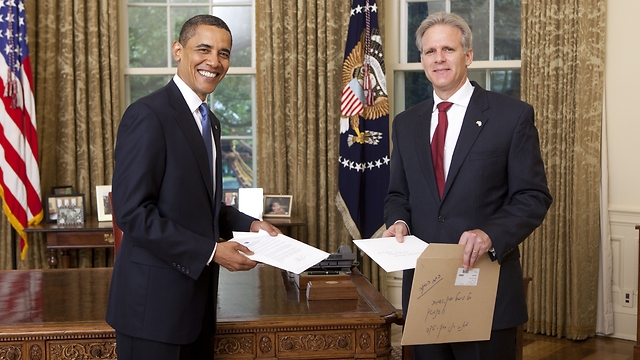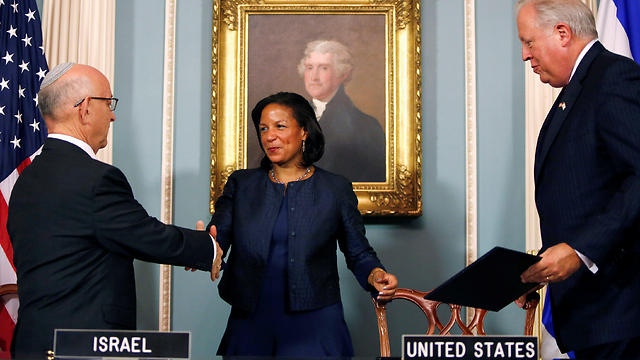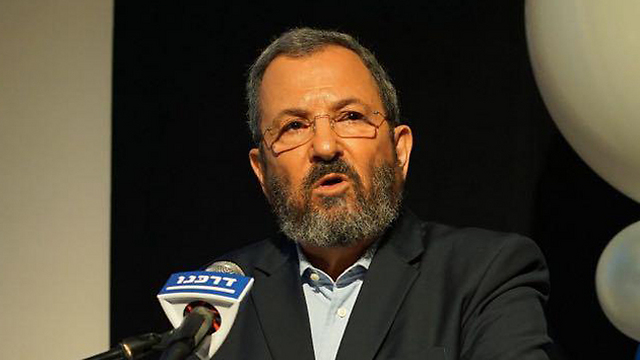
PM's former security advisor slams handling of US military aid deal
Prof. Uzi Arad says Netanyahu 'missed an historic opportunity' in his mishandling of the negotiations and 'lost out on what could have been'; argues that despite being largest ever aid package in US history, the circumstances in fact render it smaller than last decade's delivery.
“Netanyahu gambled and missed an historic opportunity,” Arad told Ynet. “I predicted this half a year ago that he would be wrong, and now I am vindicated. Reality slapped him in the face. Bibi made an error of judgment and as a result, handled matters incorrectly. As usual, the result is a loss compared with what was possible and what should have been. The State of Israel not only lost out by dint of the fact that it received fewer weapons and less funding but also missed an opportunity to achieve significant diplomatic benefits.”

The Prime Minister’s Office has painted the agreement as one of historic magnitude given that it is the largest military aid package to ever have been delivered by the US to any of its allies.
Nevertheless, Arad holds a different interpretation. “If Israel had entered into negotiations about the defense aid prior to the signing of the Iranian nuclear deal, it could have reaped diplomatic benefits,” he posited.
Arad, who over the last few years has espoused harsh criticism of Netanyahu, emphasized that the increased financial package does not, contrary to popular belief, correspond with the increased prices of weapons systems. Proportionally, therefore, he concludes that the new $3.8 billion per year Israel is due to receive actually constitutes a lower sum than the annual $3.1 billin per year under the terms of the previous agreement.
There has never been any doubt that the security aid agreement would be extended, Arad added, but “The only question on the table was whether, in light of the worsening of Israel's security situation following the nuclear deal, it was entitled to receive additional funding and arms that would give it the qualitative advantage the US has committed to help it maintain.”
“The expectation was that the agreement would be extended and that there would be an expansion or an increase of two kinds,” Arad explained. “Had we heeded to the (US) administation's pleas not to disrupt the attainment of an Iran agreement, they were prepared to give us different rewards—not just as compensatin, but as taking advantage of a propitious opportunity.”
Arad went on to say that senior American officials sent Israel a very clear message: "Name your price."
"This means that had (the negotiations) been done in an atmosphere of goodwill and celebration, (the Americans) would've given Israel a varied package of benefits that could have included the promise of American veto at the UN Security Council, scientific and technological cooperation as there never was before, and support in the construction of walls along Israel's borders—including the Syrian border, which would've given recognition to the Israeli claim over the Golan Heights.
"When our representatives sat at the negotiating table, it turned out that not only does the package not include any significant qualitative upgrades or upgrades on the diplomatic front, but there is also a significant worsening of the financial component. It undermines our ability to use the money for our own defense industry. This is an unexpected blow that they were only able to postpone, not prevent.
"The second blow was when (the US administration) tried to block Israel's ability to turn to Congress after the elections and ask for additional things. They turned the commitment to not do so into an integral part of the agreement. There has been an error in judgment here, a certain situation assessment tha overestimated our power and underestimated what the Americans would do. As a result of this, we preserved with the campaign and missed the golden opportunity the Americans presented us with. Now we need to get a package with no option of improving it in the future, which no doubt disappoints Netanyahu."
Meanwhile, former prime minister and former defense minister Ehud Barak published an op-ed on the Washington Post on Wednesday criticizing the security aid package and Netanyahu himself.
"The damage produced by Netanyahu’s irresponsible management of the relations with the White House is now fully manifest," Barak wrote.
"Israel will receive $3.8 billion a year—an important contribution to our security but far less than what could have been obtained before the prime minister chose to blatantly interfere with US politics," he added.
Sources close to Netanyahu said in response to Barak's criticism that "Barak, who told the whole world that the prime minister hurt the relations with the US, should be eating his hat today rather than write false articles."
'If Congress wants to give us more—it can'
Deputy Minister Michael Oren (Kulanu), who served as Israel's ambassador to the US for four years, strongly disagrees with Arad and Barak.
"This is an historic agreement, a very good one," he said. "I've been involved (with this issue) for many years. We committed not to ask for any additional funds from Congress, but if Congress wants to give us more funds—that's for it to decide. In states of emergency, Israel would be able to seek supplements. All of the objectives we sought—we've received.

"On the issue of reciprocal acquisitions, the Americans demanded that we have no abiity to use shekels (to purchase products from the Israeli defense industry), and in the end we got 70 percent, with a gradual reduction. This is the first time that the aid for (missile defense systems) Iron Dome, David's Sling and Arrow is part of the package. In the past, we asked for (funding for these programs) every year, and the question of whether we'll get what we need was in doubt. Now we know in advance what we're going to get, and if there is need for more interceptors—we could ask for them.
"I don't accept the claim that we could've received more had we removed our objection to the Iran deal. The negotiations for the aid package began long before the Iran talks. We would've gotten the same thing even if we welcomed the agreement with Iran. It's not a given that we would get such an impressive aid package from one president or another."
 |













